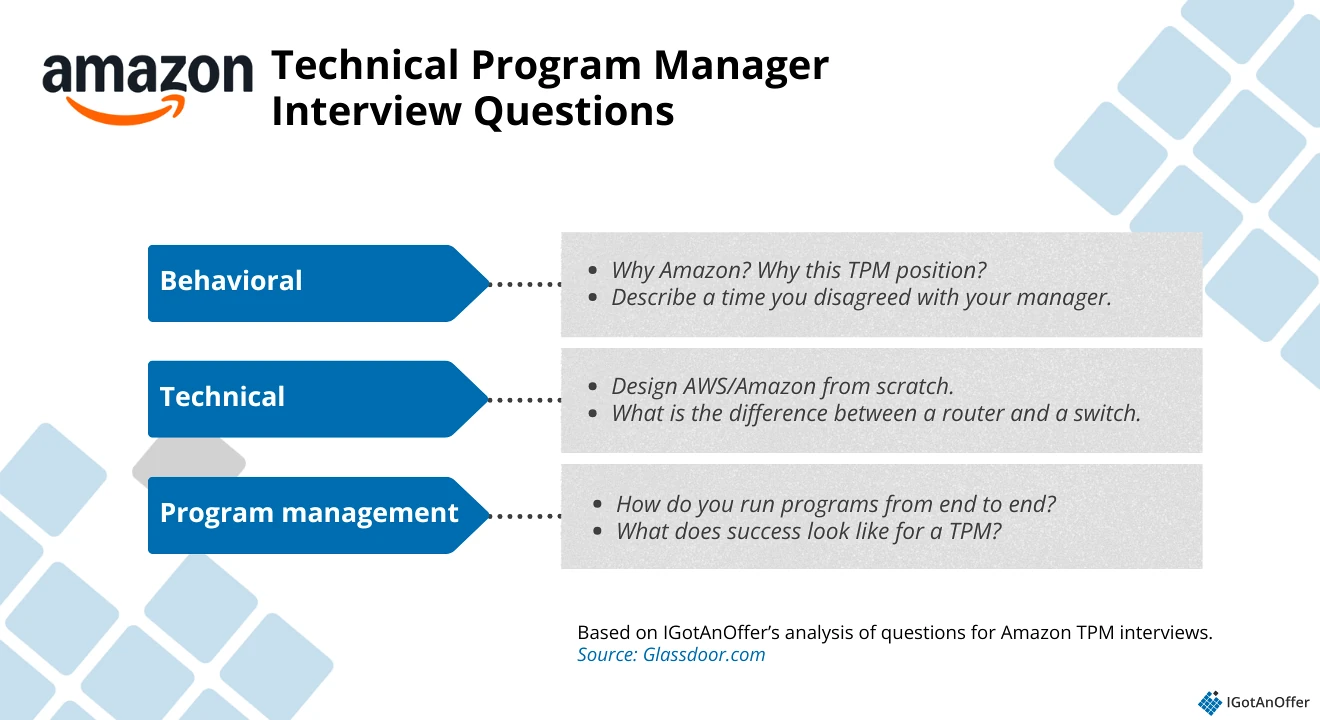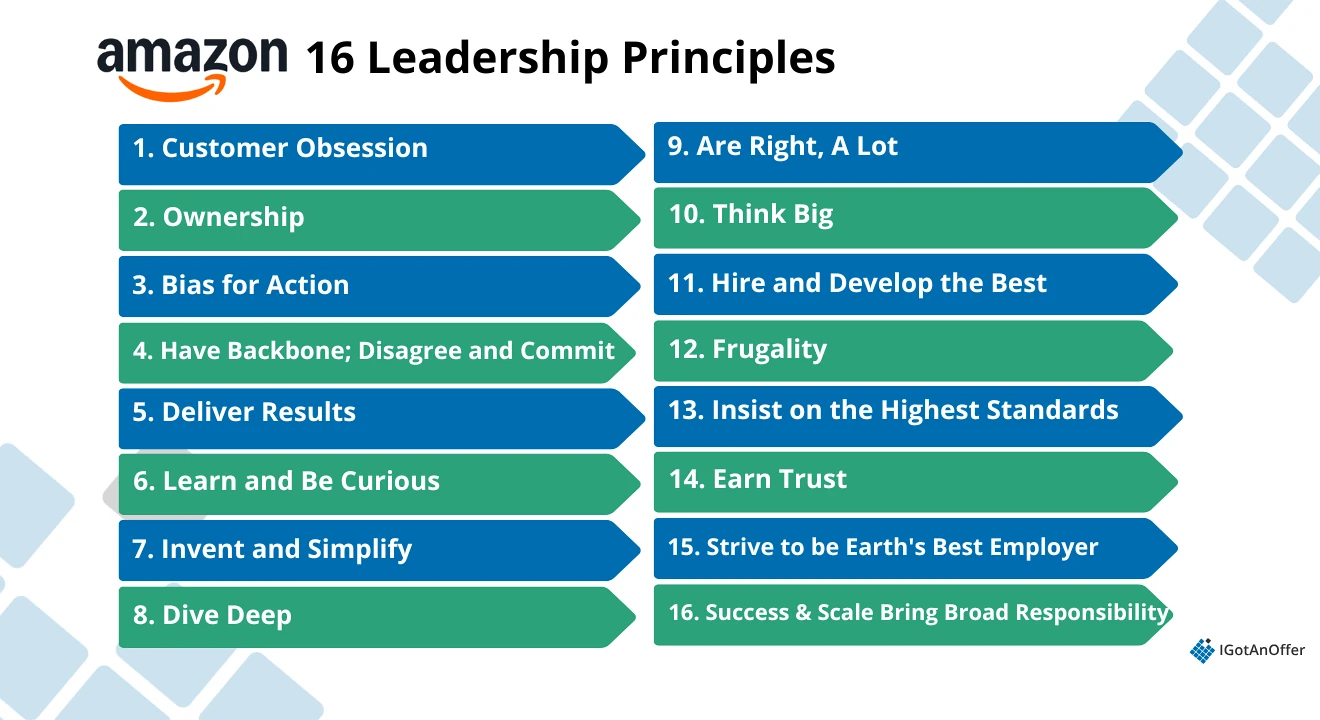Amazon Technical Program Manager (TPM) interviews are really challenging. The questions are difficult, specific to Amazon, and cover a wide range of topics.
The good news is that the right preparation can make a big difference and can help you land a job as a TPM at Amazon (or AWS). To help you get there, we have put together the ultimate guide below.
Here's an overview of what we'll cover:
Click here to practice mock interviews 1-on-1 with TPM ex-interviewers
1. Interview process and timeline
1.1 What interviews to expect
What's the Amazon Technical Program Manager (TPM) interview process and timeline? It takes takes four to eight weeks and follows the steps below. Note that the process at AWS follows similar steps.
- Resume screen
- Recruiter phone screen: one interview
- TPM phone screens: one to two interviews
- Writing exercise
- TPM onsite: four to six interviews
Let's look at each of these steps in more detail below:
1.1.1 Resume screen
First, recruiters will look at your resume and assess if your experience matches the open position. This is the most competitive step in the process, as millions of candidates do not make it past this stage.
You can use this free TPM resume guide to help tailor your resume to the position you’re targeting. And check out our Amazon resume guide to see examples of resumes that successfully passed Amazon screening.
And if you’re looking for expert feedback, you can also get input from our team of ex-Amazon recruiters, who will cover what achievements to focus on (or ignore), how to fine-tune your bullet points, and more.
1.1.2 Recruiter phone screen
In most cases, you'll start your interview process with Amazon by talking to a Recruiter on the phone. They are looking to confirm that you've got a chance of getting the job at all, so be prepared to explain your background and why you’re a good fit at Amazon.
You should expect typical behavioral and resume questions like, "Tell me about yourself", "Why Amazon?", or "Tell me about your current day to day as a Technical Program Manager." When answering even the most common interview questions, be sure to express your understanding of Amazon’s Leadership Principles (more on that below).
1.1.3 TPM phone screen
If you've passed the HR screen, you'll be invited to one or two TPM phone screens. This step is called a "phone screen", but it sometimes takes place over video chat using Amazon Chime which is the company's video conferencing product.
Each interview will last 45 to 60 minutes. You'll speak to a TPM peer or a potential manager and they'll ask you a mix of system design and behavioral questions.
The role of the phone screen is to make sure it's worth bringing you onsite. Your interviewer will therefore try to make sure there isn't an area where you are particularly weak and don't stand a chance to meet the hiring bar.
1.1.4 Amazon writing exercise
If you pass the TPM phone screen process, in some cases you’ll be asked to write a one to two page essay in preparation for your onsite interviews about a topic such as: “What is the most innovative project that you have worked on?” or “Talk about an experience in which you were able to simplify the lives of your customers.”
Written communication is at the core of Amazon's culture. And TPMs in particular write a lot of documents. This exercise aims at testing if you can write in a structured and clear way. It’s important to remember that interviewers will be looking for how your essay relates to the leadership principles independently of whether this is stated in the assignment instructions or not.
1.1.5 Onsite interviews
If you crack the phone screen, the next step is to spend a full day at one of Amazon’s offices and participate in four to six interviews. These interviews will last 45 to 60mins and be a one-on-one with a mix of people from the team you’re applying to join, including peers, the hiring manager, and a senior executive.
Question types
You can expect one or two interviews to be mainly focused on system design, and the rest on behavioral questions that test you on Amazon's leadership principles. You may also get some program management questions mixed in.
System design questions are usually either about diving deep into the design of system you've previously worked on (e.g. Tell me about the design of the most complex project you've worked on). Or about designing a new system from scratch (e.g. How would you design Amazon Video).
One common mistake candidates make is to under-prepare for behavioral questions. Each interviewer is usually assigned two or three leadership principles to focus on during your interview. These questions are much more important at Amazon than they are other big tech companies like Google or Facebook.
Bar raiser
Finally, one of your last interviews will be with what Amazon calls a “Bar Raiser”. These interviewers are not associated with the team you’re applying for, and focus more on overall candidate quality than specific team needs. They get special training to make sure Amazon’s hiring standards stay high and don’t degrade over time, so they are a big barrier between you and the job offer.
1.2 What exactly is Amazon looking for
At the end of each interview your interviewer will grade your performance using a standardized feedback form that summarizes the attributes Amazon looks for in a candidate. That form is constantly evolving, but we have listed some of its main components below.
A) Notes
The interviewer will file the notes they took during the interview. This usually includes: the questions they asked, a summary of your answers and any additional impressions they had (e.g. communicated ABC well, weak knowledge of XYZ, etc).
B) Technical program management competencies
Your interviewer will then grade you on technical program management competencies. They will be trying to determine whether you are "raising the bar" or not for each competency they have tested. In other words, you'll need to convince them that you are at least as good as or better than the average current Amazon TPM the level you're applying for (e.g. Senior TPM).
The exact technical competencies you'll be evaluated against vary by role. But here are some common ones for TPM roles:
- Communication
- Delivery
- Architecture design
- Etc.
C) Leadership principles
Your interviewer will also grade you on Amazon's 16 leadership principles and assess whether you're "raising the bar" for those too. As mentioned above each interviewer is given two or three leadership principles to grill you on. Here are some of the most commonly tested principles for TPM roles:
- Customer Obsession
- Ownership
- Bias for Action
- Have Backbone; Disagree and Commit
- Etc.
D) Overall recommendation
Finally, each interviewer will file an overall recommendation into the system. The different options are along the lines of: "Strong hire", "Hire", "No hire", "Strong no hire".
1.3 What happens behind the scenes
Your recruiter is leading the process and taking you from one stage to the next. Here's what happens at each of the stages described above:
- After the phone screens, your recruiter decides to move you to the onsite or not, depending on how well you've done up to that point
- After the onsite, each interviewer files their notes into the internal system, grades you and makes a hiring recommendation (i.e. "Strong hire", "Hire", "No hire", "Strong no hire")
- The "Debrief" brings all your interviewers together and is led by the Bar Raiser, who is usually the most experienced interviewer and is also not part of the hiring team. The Bar Raiser will try to guide the group towards a hiring decision. It's rare, but they can also veto hiring even if all other interviewers want to hire you.
- You get an offer. If everything goes well, the recruiter will then give you an offer, usually within a week of the onsite but it can sometimes take longer. Get ready to negotiate with our Amazon salary negotiation guide, or book a salary negotiation coach to practice with an expert.
It's also important to note that recruiters and people who refer you have little influence on the overall process. They can help you get an interview at the beginning, but that's about it.
2. Example questions
The main difficulty with TPM interviews at Amazon is that you'll be asked a wide range of questions. We've grouped them in three buckets and analyzed how frequently they were asked by Amazon interviewers using TPM interview reports available on Glassdoor.
Here are the results of our analysis:
- Behavioral questions (54%)
- Technical questions (36%)
- Program management questions (10%)

2.1 Behavioral questions (54%)
Amazon’s TPM interview process heavily focuses on assessing if you live and breathe the company’s 16 Leadership Principles. The main way Amazon tests this is with behavioral questions which you'll be asked in every interview.
TPM interviews tend to primarily focus on the first six principles we have highlighted below, according to our analysis of over 200 Amazon TPM interview reports on Glassdoor. The other eight topics also come up but less frequently.

Amazon's Leadership Principles:
- Customer Obsession
- Ownership
- Bias for Action
- Have Backbone; Disagree and Commit
- Deliver Results
- Learn and Be Curious
- Invent and Simplify
- Dive Deep
- Are Right, A Lot
- Think Big
- Hire and Develop the Best
- Frugality
- Insist on the Highest Standards
- Earn Trust
- Strive to be Earth's Best Employer
- Success and Scale Bring Broad Responsibility
Below is a breakdown of each leadership principle and how you’ll be asked about them during your interview process with Amazon.
2.3.1 "Customer obsession" interview questions
Customer obsession — "Leaders start with the customer and work backwards. They work vigorously to earn and keep customer trust. Although leaders pay attention to competitors, they obsess over customers.”
Customer obsession is about empathy. Interviewers want to see that you understand the consequences that every decision has on customer experience. You need to know who the customer is and their underlying needs, not just the tasks they want done.
This is by far the most important leadership principle used at Amazon. Therefore, it is the most critical one to prepare for.
Example "customer obsession" questions asked by Amazon
- Tell me about a time you had to deal with a difficult client / customer
- Tell me about a time you went above and beyond for a customer
- Tell me about a time you had to disappoint a customer
- Tell me about a time you had to deal with an unreasonable customer request
2.3.2 "Ownership" interview questions
Ownership — "Leaders are owners. They think long term and don’t sacrifice long-term value for short-term results. They act on behalf of the entire company, beyond just their own team. They never say “that’s not my job.”
Interviewers at Amazon want to avoid hiring people who think, “That’s not my job!” This is particularly important for TPMs as they work on cross-functional projects and are responsible for overall delivery. When answering ownership questions, you’ll want to prove that you take initiative, can make tough decisions, and take responsibility for your mistakes.
Example "ownership" questions asked by Amazon
- Describe a time where a feature deliverable was falling between two teams with neither taking ownership and referring to the other team. How did you address the situation?
- Tell me about a time you did something at work that wasn't your responsibility / in your job description
- Describe an instance where you had to make an important decision without approval from your boss
- Tell me about a time you took ownership of a problem that was not the focus of your organization
- How would you make Amazon.com better?
- When was the last time that you sacrificed a long term value to complete a short term task?
2.3.3 "Bias for action" interview questions
Bias for action — "Speed matters in business. Many decisions and actions are reversible and do not need extensive study. We value calculated risk taking.”
Since Amazon likes to ship quickly, they also prefer to learn from doing (while also measuring results) vs. performing user research and making projections. They want to see that you can take calculated risks and move things forward.
Example "bias for action" questions asked by Amazon
- Tell me about a time you had to change your approach because you were going to miss a deadline
- Tell me about a time you had to make a decision with incomplete information. How did you make it and what was the outcome?
- Tell me about a time when you launched a feature with known risks
- Tell me about a time you broke a complex problem into simple sub-parts
- Tell me about a time you took a risk
2.3.4 "Have backbone; disagree and commit" interview questions
Have backbone; disagree and commit — "Leaders are obligated to respectfully challenge decisions when they disagree, even when doing so is uncomfortable or exhausting. Leaders have conviction and are tenacious. They do not compromise for the sake of social cohesion. Once a decision is determined, they commit wholly.”
Any group of smart leaders will disagree at some point. Amazon wants to see that you know when to challenge ideas and escalate problems to senior leadership. At the same time, they want to know you can sense the right time to move forward regardless of your disagreement.
Example "have backbone; disagree and commit" questions asked by Amazon
- Tell me about a time you had a conflict with a coworker or manager and how you approached it
- Tell me about a time you disagreed with your team and convinced them to change their position
- Tell me about a time you had a conflict with your team but decided to go ahead with their proposal
- Tell me about a time your work was criticized
2.3.5 "Deliver results" interview questions
Deliver results — "Leaders focus on the key inputs for their business and deliver them with the right quality and in a timely fashion. Despite setbacks, they rise to the occasion and never settle.”
Amazon values action over perfection. When answering questions related to delivering results, you’ll want to indicate that you dislike slipped deadlines and failed goals.
Example "deliver results" questions asked by Amazon
- Tell me about the most challenging project you ever worked on
- How do you prioritize in your current role?
- What's your approach to manage projects and deliver on time as a TPM?
- Tell me a time that you overcame a major challenge at work
- What did you do the last time your team failed a deadline?
- How do you resolve a project which is delayed?
2.3.6 "Learn and be curious" interview questions
Learn and be curious — "Leaders are never done learning and always seek to improve themselves. They are curious about new possibilities and act to explore them.”
Amazon demands constant improvement in every part of their business. You’ll want to show that you are interested in learning new things and exploring new ideas.
Example "learn and be curious" questions asked by Amazon
- Tell me about a time you failed to deliver at work and what you did
- What technologies are you learning at the moment?
- What's your biggest career failure and what you learned from it
- Tell me about a time you were wrong and what you did
- Why Technical Program Management?
2.3.7 "Invent and simplify" interview questions
Invent and simplify — "Leaders expect and require innovation and invention from their teams and always find ways to simplify. They are externally aware, look for new ideas from everywhere, and are not limited by “not invented here." Because we do new things, we accept that we may be misunderstood for long periods of time.”
Amazon relies on a culture of innovation. Answering invent and simplify questions is an opportunity to show your ability to create solutions when there is no obvious answer. You’ll also want to show that you know how to execute big ideas as simply and cheaply as possible.
Example "invent and simplify" questions asked by Amazon
- Tell me about a time you invented something new
- What is the most innovative idea you've ever had?
- Tell me how you built a feature in an innovative way, give specific details
2.3.8 "Dive deep" interview questions
Dive deep — "Leaders operate at all levels, stay connected to the details, audit frequently, and are skeptical when metrics and anecdote differ. No task is beneath them.”
TPMs need to identify technical dependencies, anticipate problems and quickly fix them if they arise. Interviewers want to see that you are excited about trying to prevent projects from derailing and about stepping up when things don't go as expected.
Example "dive deep" questions asked by Amazon
- Tell me about a project in which you had to deep dive into analysis
- Tell me about the most complex problem you have worked on
- Describe an instance when you used a lot of data in a short period of time
2.3.9 "Are right, a lot" interview questions
Are right, a lot — "Leaders are right a lot. They have strong judgment and good instincts. They seek diverse perspectives and work to disconfirm their beliefs.”
Amazon expects its Technical Program Managers to produce solutions as quickly as possible and to make a lot of decisions with little information. You’ll want to demonstrate skill in taking calculated risks and show that you're comfortable disproving your own opinions before moving ahead.
Example "are right, a lot" questions asked by Amazon
- Describe a time you made a mistake
- Tell me about a time you applied judgment to a decision when data was not available
- Tell me about a time you had very little information about a project but still had to move forward
2.3.10 "Think big" interview questions
Think big — "Thinking small is a self-fulfilling prophecy. Leaders create and communicate a bold direction that inspires results. They think differently and look around corners for ways to serve customers.”
Amazon is huge and its TPMs need to build products that reach significant scale to make a difference for the business. As a result, interviewers will want to see that you can develop and articulate a bold vision.
Example "think big" questions asked by Amazon
- Describe a time you proposed a non-intuitive solution to a problem and how you identified that it required a different way of thinking
- Give a specific example where you drove adoption for your vision and explain how you knew it had been adopted by others
- Tell me about your most significant accomplishment. Why was it significant?
2.3.11 "Hire and develop the best" interview questions
Hire and develop the best — "Leaders raise the performance bar with every hire and promotion. They recognize exceptional talent, and willingly move them throughout the organization. Leaders develop leaders and take seriously their role in coaching others. We work on behalf of our people to invent mechanisms for development like Career Choice.”
As mentioned above, Amazon wants new hires to “raise the bar.” Interviewers will want to see that you are not afraid of working with and hiring people smarter than you. You should also show you enjoy coaching younger colleagues and know how to get the most out of top performers. You’ll notice the examples listed here are general interview questions, but they provide a perfect opportunity for you to address this principle.
This leadership principle is typically discussed in interviews for very senior engineering positions that involve people management or building a team (e.g. Senior Technical Program Manager, etc.).
Example "hire and develop the best" questions asked by Amazon
- Describe a time you provided feedback that was helpful to a peer
- Who is your best employee / resource and what makes them the best
- Tell me about a time you helped boost your team morale
- Tell me about a time you hired or worked with people smarter than you are
2.3.12 "Frugality" interview questions
Frugality — "Accomplish more with less. Constraints breed resourcefulness, self-sufficiency, and invention. There are no extra points for growing headcount, budget size, or fixed expense.”
At every touchpoint, Amazon tries to provide customers with as much value for as little cost as possible. Interviewers will be looking for how you can support this idea while maintaining a constant drive for innovation.
Example "frugality" questions asked by Amazon
- Tell me about a time you successfully delivered a project without a budget or resources
- Describe the last time you figured out a way to keep an approach simple or to save on expenses
2.3.13 "Insist on the highest standards" interview questions
Insist on the highest standards — "Leaders have relentlessly high standards — many people may think these standards are unreasonably high. Leaders are continually raising the bar and drive their teams to deliver high quality products, services, and processes. Leaders ensure that defects do not get sent down the line and that problems are fixed so they stay fixed.”
Amazon takes the view that nothing is ever “good enough.” They’d like to see that you push for standards that are difficult to meet.
Example "insist on the highest standards" questions asked by Amazon
- Describe a project that you wish you had done better and how you would do it differently today
- Tell me about the most successful project you've done
- How do you ensure standards are met when delivering projects?
2.3.14 "Earn trust" interview questions
Earn trust — "Leaders listen attentively, speak candidly, and treat others respectfully. They are vocally self-critical, even when doing so is awkward or embarrassing. Leaders do not believe their or their team’s body odour smells of perfume. They benchmark themselves and their teams against the best.”
The key part of that principle candidates often miss is the “vocally self-critical.” Amazon wants TPMs who focus on fixing mistakes instead of figuring out who to blame. You’ll want to show that you take action when something is wrong and acknowledge your own faults before blaming other people and teams.
Example "earn trust" questions asked by Amazon
- How do you earn trust with a team?
- What are you most often criticised for?
- What was the feedback in your latest performance review?
- Tell me a piece of difficult feedback you received and how you handled it
- A co-worker constantly arrives late to a recurring meeting. What would you do?
2.3.15 "Strive to be Earth’s Best Employer" interview questions
Strive to be Earth's best employer - "Leaders work every day to create a safer, more productive, higher performing, more diverse, and more just work environment. They lead with empathy, have fun at work, and make it easy for others to have fun. Leaders ask themselves: Are my fellow employees growing? Are they empowered? Are they ready for what's next? Leaders have a vision for and commitment to their employees' personal success, whether that be at Amazon or elsewhere."
Similar to the principle “hire and develop the best,” this principle is more likely to come up in interviews for senior and/or managerial positions. In this case, you’ll want to show that you’ll not only boost your team, but also create a safe, diverse, and just work environment. Essentially, if “hire and develop the best” means picking and training a top team, being “Earth’s best employer” means keeping that team safe, enriched, and engaged once you’ve got them.
Example "strive to be Earth's best employer" questions asked by Amazon
- Tell me about a time that you went above and beyond for an employee
- Tell me about a time you saw an issue that would negatively impact your team. How did you deal with it?
- How do you manage a low performer in the team? How do you identify a good performer in the team and help in their career growth?
2.3.16 "Success and Scale Bring Broad Responsibility" interview questions
Success and scale bring broad responsibility — "We started in a garage, but we're not there anymore. We are big, we impact the world, and we are far from perfect. We must be humble and thoughtful about even the secondary effects of our actions. Our local communities, planet, and future generations need us to be better every day. We must begin each day with a determination to make better, do better, and be better for our customers, our employees, our partners, and the world at large. And we must end every day knowing we can do even more tomorrow. Leaders create more than they consume and always leave things better than how they found them.”
Amazon wants its employees to understand the responsibility of working for a vast, impactful company. Show how you measure the impact of your decisions, both in your workspace and in the world around you (e.g. sustainability, justice, etc.). You must always be willing to improve.
Example "success and scale bring broad responsibility" questions asked by Amazon
- Give me an example on when you made a decision which impacted the team or the company
- Can you tell me a decision that you made about your work and you regret now?
2.2 Technical questions (36%)
You're certain to come across one or two system design questions in your TPM loop. In addition, you might also be asked technical explanation questions and in rare cases coding questions.
2.1.1 System design questions
Amazon TPMs tend to work on very technical programs. They need to be able to engage in system design discussions with engineers and to discuss the merits of architecture A vs. architecture B. This is the part of the interview process where you need to show that you have thorough technical knowledge and can discuss architecture concepts in a clear and structured way.
In addition, unlike most smaller companies, Amazon's products have millions of monthly active users. Amazon's systems therefore need to be able highly scalable. As a consequence, you should expect part of the design discussion to focus on performance, efficiency and scalability.
As mentioned previously, system design questions are usually either about diving deep into the design of a system you've previously worked on (e.g. Tell me about the design of the most complex project you've worked on). Or about designing a new system from scratch (e.g. How would you design Amazon Video).
2.1.2 Technical explanation questions
Technical explanation questions aim to test the depth of your technical knowledge, and your ability to communicate that knowledge in a simple way. A typical example would be: "What happens when you enter a URL in your browser?"
Your interviewer will usually ask you technical questions based on the projects and technologies listed on your resume. You should therefore brush up on the technologies you've used in the past.
In other words, a TPM with a software development background will be asked different technical questions than a TPM with a background in machine learning, embedded systems or hardware engineering.
2.1.3 Coding questions
Coding questions are rare but still sometimes mentioned in interview reports. If you're currently an engineer then you'll probably be asked to write working code. But, if you are currently in another role than engineering then pseudo-code will most likely be fine. Also, notice that the questions asked are easier than the Leetcode questions you can expect in Amazon software engineer interviews.
Finally, below are the most common system design questions according to the Amazon interview reports which can be found on Glassdoor.
Example technical questions asked in Amazon TPM interviews
1. System design questions
- Tell me about a system you recently worked on in detail (+ follow up questions)
- Design AWS
- Design Amazon.com
- Design a system that's capable of displaying an ebook 60s or less after purchase
- Design a system that keeps track of the last 10 products a user has browsed on Amazon.com
- Design a database for a tiny URL implementation
- Design a software for an elevator system
- Design a vending machine
- Design an ads auction service
- Design a virus scanner
- Design an anti-virus scanner
- How would you develop the back end of a parking app?
2. Technical explanation questions
- What is the difference between a router and a switch?
- What is the computational complexity of hash tables?
- What is a linked list? Double linked list?
- What is the lookup time for linked lists / trees?
- How are mobile devices made secure?
- How are passwords passed securely from server to client?
- What is happening if a webpage is timing out when downloading?
- How would you reduce the time it takes to transfer 4GB into a pendrive by 50%?
- How does Amazon.com work?
- How does Microsoft Outlook update its software?
3. Coding questions
- Write a program that reverts a string
- Write a program to find common items between two linked lists
- Write a program that traverses a linked list
- Write a program to identify all the equal elements between two arrays
- Write a test scenario for copying a file from one location to another using a wireless connection
2.3 Program management questions (10%)
Amazon TPMs design and execute programs from end-to-end. It's therefore important that they have a strong ability to plan, prioritize and deliver projects.
This is the part of the interview process where you need to show you think about programs in a comprehensive way (e.g. resources, risks, vendors, etc.) and have a track record of executing flawlessly.
We've listed typical program management questions you can expect below. Notice that almost all questions on the list can be asked as hypothetical questions (e.g. How do you manage programs from end-to-end?), or behavioral questions (e.g. Tell me about a time you managed a program from end-to-end).
Although the two phrasings are similar they require different answers. For hypothetical questions, you should explain your hypothetical approach to the question asked (e.g. I would do XYZ to manage a program.) And for behavioral questions, you need to take an actual example from your past and explain what you did (e.g. I did ABC to manage my program last year).
This might sound obvious, but it's a common mistake candidates make in interviews that's easy to avoid.
Example program management questions asked in Amazon TPM interviews
- What method / process do you use to run a project from end-to-end?
- What does success look like for a technical program manager?
- What's the difference between program management and technical program management?
- What's your process for change and incident management?
- How do you make prioritization decisions?
- How do you create a strategy and roadmap for your programs?
- How do you manage risks in your programs?
- How do you manage external team dependencies in your programs?
- You're working on a program where part of the features were completed with errors. The team that's responsible has moved on to another project and has no time to fix the errors. What do you do?
- How do you manage delivery closure?
- How do you change control?
- What's the hardest thing in moving a team to Agile?
3. How to prepare
Now that you know what questions to expect, let's focus on how to prepare. Here are the four most important things you can do to prepare for your Amazon (or Amazon Web Services) technical program manager interviews.
3.1 Learn about Amazon's culture
Most candidates fail to do this. But before investing tens of hours preparing for an interview at Amazon, you should take some time to make sure it's actually the right company for you.
Amazon is prestigious and it's tempting to assume that you should apply, without considering things more carefully. But, it's important to remember that the prestige of a job (by itself) won't make you happy in your day-to-day work. It's the type of work and the people you work with that will.
If you know TPMs or engineers who work at Amazon or used to work there, talk to them to understand what the culture is like. The leadership principles we discussed above can give you a sense of what to expect, but there's no replacement for a conversation with an insider. Finally, we would also recommend reading the following resources:
- Amazon's technology culture video mix (by Amazon)
- Amazon vision and mission analysis (by Panmore Institute)
- Amazon strategy teardown (by CB Insights)
3.2 Practice by yourself
As mentioned above, you'll have to answer two types of questions at Amazon: technical and behavioral. The first step of your preparation should be to brush up on these different types of questions and to practice answering them by yourself.
3.2.1 Behavioral interview preparation
For behavioral interviews, we recommend learning our step-by-step method and creating a bank of 10+ personal stories where you've displayed the traits that Amazon looks for in leaders. Each of your stories will naturally touch on multiple Amazon leadership principles.
Once you've got a bank of stories, you can practice using them to answer the Glassdoor questions we've listed above. You should emphasize different aspects of your story depending on the exact question asked. We'd also recommend consulting our leadership and people management primers for extra prep.
3.2.2 Technical interview preparation
For system design questions, we recommend getting used to the step-by-step approach hinted at by Amazon in the video below.
Here is a summary of the approach:
- Step 1: Ask clarification questions
- Understand the goal of the system (e.g. sell ebooks)
- Establish the scope of the exercise (e.g. end-to-end experience, or just API?)
- Gather scale and performance requirements (e.g. 500 transactions per second)
- Mention any assumptions you're making out loud
- Step 2: Design at a high level then drill down
- Lay out the high level components (e.g. front-end, web servers, database)
- Drill down and design each component (e.g. front-end first)
- Start with the components you're most comfortable with (e.g. front-end if you're a front-end engineer)
- Work with your interviewer to provide the right level of detail
- Step 3: Bring it all together
- Refer back to the requirements to make sure your approach meets them
- Discuss any tradeoffs in the decisions you've made
- Summarize how the system would work end-to-end
We'd also recommend studying our system design interview questions and prep guide, which digs into this method in more detail. It also provides several example questions with solutions.
For technical explanation and coding questions, we recommend learning the step-by-step method we've developed. To practice, you can use that method to craft answers to the technical questions listed in the previous section.
3.2.3 Program management questions
For program management questions, we recommend starting by brushing up on the basics with our program management primer. You could also take a free course designed to prepare for the Project Management Professional (PMP) exam such as this course on LinkedIn Learning.
This will give you an opportunity to refresh your memory on all key aspects of project management including: scope, schedule, resources, cost, quality, communication, risk, stakeholders, etc.
In addition, if you're interviewing for a TPM role in software development, you should make sure you're on top of common concepts used in Agile project management. A great resource here is Atlassian's Agile project management guide. In particular, we recommend brushing up on the difference between Kanban and Scrum, and the common structures used in Agile projects (e.g., epics, stories, themes, etc.).
Similarly, if you're applying for a hardware TPM role then you'll want to be on top of the different engineering validation stages (EVT, DVT, PVT).
You might also want to take a look at our guide for the Amazon program manager interview which shows how program management questions can be categorised across the lifecycle of a project.
Once you've refreshed your memory on project management best practices you should go through the list of program management questions we've listed in the previous section and draft answers for those.
Are you also preparing for TPM interviews at other FAANG companies? You may find our Google TPM interview guide and Meta TPM interview guide helpful as well.
3.3 Practice with peers
If you have friends or peers who can do mock interviews with you, that's an option worth trying. It’s free, but be warned, you may come up against the following problems:
- It’s hard to know if the feedback you get is accurate
- They’re unlikely to have insider knowledge of interviews at your target company
- On peer platforms, people often waste your time by not showing up
For those reasons, many candidates skip peer mock interviews and go straight to mock interviews with an expert.
3.4 Practice with experienced Amazon interviewers
In our experience, practicing real interviews with experts who can give you company-specific feedback makes a huge difference.
Find an Amazon TPM interview coach so you can:
- Test yourself under real interview conditions
- Get accurate feedback from a real expert
- Build your confidence
- Get company-specific insights
- Learn how to tell the right stories, better.
- Save time by focusing your preparation
Landing a job at a big tech company often results in a $50,000 per year or more increase in total compensation. In our experience, three or four coaching sessions worth ~$500 make a significant difference in your ability to land the job. That’s an ROI of 100x!
Click here to book TPM mock interviews with experienced Amazon interviewers















